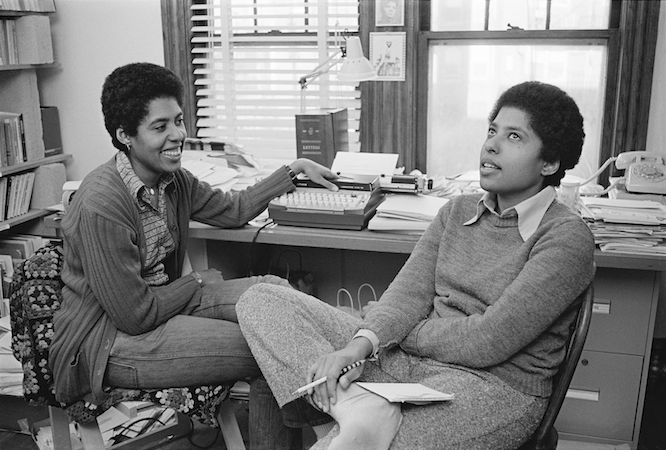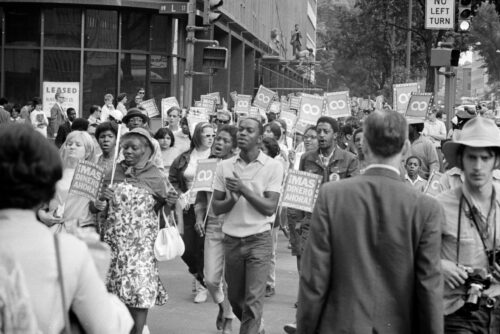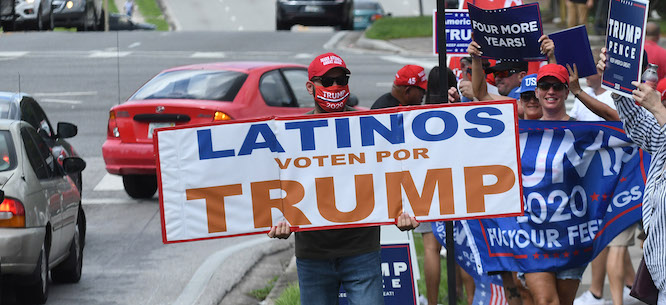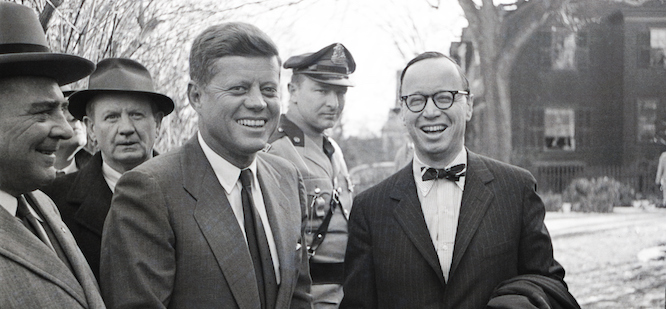“We have to be politically serious about how much agreement and how much alignment we’re going to require in a world of a resurging far-right fascist movement across the globe,” says philosopher and author Olúfẹ́mi O. Táíwò. In this episode of “Movement Memos,” Táíwò and host Kelly Hayes discuss the lessons of Táíwò’s book, Elite Capture: How the Powerful Took Over Identity Politics (And Everything Else).
Music by Son Monarcas and Ever So Blue
TRANSCRIPT
Note: This a rush transcript and has been lightly edited for clarity. Copy may not be in its final form.
Kelly Hayes: Welcome to “Movement Memos,” a Truthout podcast about solidarity, organizing and the work of making change. I’m your host, writer and organizer Kelly Hayes. Today, we are talking about identity politics, social media and navigating difference within our movements. We will be hearing from Olúfẹ́mi Táíwò, a professor of philosophy at Georgetown University, and author of the book Elite Capture: How the Powerful Took Over Identity Politics (And Everything Else). If you have anything to do with leftist politics, you have probably heard various critiques of “identity politics,” but in his book, Olúfẹ́mi makes a powerful case that it isn’t identity politics that have caused fractures and immobilization in our movements, but rather, a phenomenon known as elite capture. We are going to get into what that means in a moment, but first, I wanted to talk a bit about the CIA’s recent unveiling of a statue of Harriet Tubman outside their headquarters in suburban Virginia, because there are some connections to be made here.
In statements to the press, the CIA emphasized the covert nature of Tubman’s work on the Underground Railroad, and highlighted her work behind enemy lines, in support of the Union Army during the Civil War. The agency also took the opportunity to emphasize to the press that the CIA has made gains in diversity, with a 3 percent increase in minority hiring over the last two years. Of course, when most of us demand equality, we are not talking about a more colorful assortment of trained assassins doling out imperial violence abroad. However, not everyone welcomed critiques of the disconnect between what Harriet Tubman’s life and work were about and the death-making, anti-democratic, imperial violence of the CIA. On Twitter, for example, critics of the CIA’s co-option of Tubman’s legacy were lectured by some people that Tubman was, in fact, a spy, which made the honor fitting and appropriate. I saw some people note that Tubman’s great-great-great grandniece was in attendance and smiling. CIA Director William Burns told NBC News, “For all of us, this statue will not only remind us of Tubman’s story. It will inspire us to live by her values.”
Now, if you are listening to this show, I assume you are not someone who can be duped into believing that the CIA shares the values of Harriet Tubman. In fact, I have zero doubt that if Tubman were alive today, she would be working in opposition to the harms of law enforcement, in some capacity or another. It is more likely that she would be breaking people out of prisons than working for a monstrous organization like the CIA. But what should we take away from this effort to co-opt a radical legacy, and the discourse that emerges around that effort? I wanted Olúfẹ́mi’s take.
Olúfẹ́mi O. Táíwò: Oh, man, what to say about the CIA having Harriet Tubman as a statue in front of their headquarters. In a lot of ways, I feel like I couldn’t possibly have anything to say about that that that situation doesn’t say about itself, but I guess I could try. There’s a lot of stuff coming out recently from the CIA ads about having more intersectional spies, I guess, to local governments embracing the kind of aesthetic of radical politics to the decades and decades of the mangling of the political legacy of people like Martin Luther King Jr. All of that really bugs me as I’m sure it bugs anybody who genuinely cares about these issues, unlike the CIA.
But it’s also, to me, something that really demonstrates the limits of a kind of criticism of a politics based on the kinds of co-optation that it faces. It’s a really good place to start thinking about identity politics in particular because the term “identity politics” comes from the Combahee River Collective, which was a group of queer Black women socialists that met in Boston and who named themselves after a raid done on the Confederacy by Harriet Tubman. I’m sure if we could get into a time-traveling device and go back to the 19th century when Harriet Tubman is fucking up the Confederacy with the help of her comrades, Black soldiers and freeing people from slavery, I’m sure she would be annoyed that the forces of global white supremacy and regime change, etc., etc., are claiming what she did a hundred and some odd years later, I don’t think she would’ve done a single thing differently, and I don’t think any of us now in 2022 should be doing anything differently just because people on the right or the center right or the center left are going to cheapen or lie about the things that we do. We have to have our own perspective on what objectives are worth it, what political frameworks are worth it, and we just have to realize that perfectly delineating good politics from bad politics isn’t a power that good politics has either at the level of actions or at the level of ideas. People will just be able to lie and cheapen things and distort and co-opt and distract. That is just what we’re in for as people involved in politics.
One thing I’ve been really trying to hold onto is the analysis of this as a kind of sign of ideological weakness by the people that we oppose as opposed to just a problem. Obviously, it is a problem that people might get confused and think that what Harriet Tubman stands for has anything to do with what the CIA stands for. I find that as repulsive as anyone does on the left. But it wasn’t too long ago that the powers that be were draping themselves in the imagery of super villains. It wasn’t too long ago that in polite company you could say, “I’m for apartheid. I’m for segregation,” so on and so forth. We think of that as ancient history. It’s not. There are people older than the end of that era.
So the fact that the powers that be are trying to drape themselves in the imagery of Harriet Tubman as opposed to the imagery of Confederates, the kind of Confederates that Harriet Tubman was shooting at, is indicative of victories that the left has had. I don’t want to at all overstate those kind of ideological victories. Of course, if the far right on the march across the globe in the US and in Italy and in Brazil and in Hungary has their way, we might very soon be back to the era where the powers that be openly say, “We’re for apartheid,” in the way that they’re starting to say now, “We’re for transphobia. We’re for fighting against critical race theory.” But in the meantime, I think it’s worth acknowledging the fact that they’re having to lie about these things is a demonstration of a kind of weakness on their part.
KH: Some people point at situations like the CIA attempting to co-opt Tubman’s legacy and say, “This is the problem with identity politics,” but Olúfẹ́mi takes a different view, arguing that the real problem is much bigger than any singular framework.
OT: I don’t think that the problem with what we’re seeing, the co-optation of Harriet Tubman or the co-optation of words like decolonize or all of these kind of anti-coalitional ways of thinking about identity that are proliferating on social media, I don’t think that those things are really about any kind of particular special problem with identity politics. I think they show us a really general problem that’s happening across a whole bunch of areas of politics, all of them I would say, which is elite capture.
Elite capture is just a practical kind of inequality. We’re used to thinking about inequality in terms of counting resources. Wealth inequality is when the wealthiest people have lots more wealth than the poorest people. How much wealth inequality is there? Well, how much wealth do they have? A society where the 1 percent have 10 percent of the wealth and land in a society is less unequal than a society where the top 1 percent have half of the wealth and land in the society. So even though we know that almost all or maybe even all societies are unequal to some degree or other, we can still make sense of the idea that some societies are more unequal than others and the level of inequality might tell us something about what’s happening politically.
We can apply that same insight to the inequality over processes, over actions itself. Social scientists who study elite capture often talk about it in terms of projects like the provision of aid, so aid gets distributed over time, and you can count who gets what percentage of that aid. What they find is a lot of times the people who are most advantaged in a city or a village or a province that is getting aid find themselves in possession of most of the aid money.
Or we could think of something that isn’t measured in dollars at all, like control over the political agenda. As Barbara Smith, one of the Combahee River Collective founders once talked about publicly, you could argue that the level of organizational investment and prioritization given to marriage equality amongst the big set of issues that queer folks face in the United States has to do with the fact that comparatively advantaged queer folks, for example, cis, white, gay men, had more to gain or more interest from preferencing that issue over other thornier issues that would’ve called more of society into question. So whether we’re thinking about dollars or the political agenda of a movement or organization, there’s kinds of inequality that play out in terms of things that people and collectives of people do, practical inequality. That is how elite capture works.
KH: In his book, Olúfẹ́mi argues that elite capture occurs throughout society. He writes:
When we look at uneven distributions of power, at every scale, in every context, the patterns of elite capture eventually show up. In the absence of the right kind of checks or constraints, the subgroup of people with power over and access to the resources used to describe, define, and create political realities — in other words, the elites — will capture the group’s values, forcing people to coordinate on a narrower social project that disproportionately represents elite interests.
So what we are talking about is a general political problem. To understand how identity politics are warped or co-opted through elite capture, we need to talk about what Olúfẹ́mi calls deference politics.
OT: Deference politics is a way that we might try to respond to the kinds of insights that make identity politics appealing in the first place. So identity politics, like a related idea of standpoint epistemology, which is just the observation that where you are in society influences what you know, and our research and our politics should probably reflect the fact that people’s social position influences what they know, whether we’re talking about standpoint epistemology or whether we’re talking about identity politics, we’re talking about ways of looking at the world politically that get off the ground starting with the observation that it matters how people are situated, who they are in the identity sense, how social systems treat them.
If we started off by thinking that was important, we would have the further question of, what is it that we should do about these important facts? Deference politics is one way of answering that question. So on deference politics, you think, well, what I should do about the fact that it matters what people’s identities are and how they’re situated in terms of what we should do politically, what I should do knowing these insights about the world is I should defer. I should find somebody from the right kind of marginalized group, when we’re dealing with a political issue that has to do with the marginalized group, and I should take political direction from them. I should pass them the mike. I should agree with the things that they say. I should support the causes that they tell me to support. I should broadly be deferential with respect to the people that I interact with from a marginalized group when we’re talking about issues that have to do with them.
I think the motivation for deference politics can come from a good place and often does come from a good place. But I don’t think that this way of responding to these important insights about the world is a good one. There’s a lot that I think goes wrong with deference politics, but I think in a lot of ways the most serious thing that goes wrong with deference politics is that it doesn’t take seriously enough the problem that structure makes to which people we’re in a position to defer to in the first place.
As I put in the book, some people are pipelined to prisons and others to PhDs. What I’m describing there is the fact that the interactions that we have with people, the people whose perspectives are put in front of us in the first place are chosen by the very system of inequality and unfairness and injustice and oppression and domination that we’re rebelling against. So it’s not an accident which people are in a position to get their views out there. That’s part and parcel of how elite capture works in the first place. I don’t think that we’re going to get a representative view of any marginalized group by just deferring to whichever one the system happens to put in a room with us. But maybe more importantly, even if we did get a representative view of what marginalized people think about political issues by deference, by deferring to whoever it is that we happen to interact with, we wouldn’t really be, by doing that, necessarily answering the kinds of political questions that we’re trying to answer.
The question about how to end oppression just isn’t the question about what that oppression is really like or what the perspectives of oppressed people are. It’s a question about how to remake the world and what it’s going to take tactically, strategically, mechanically, technically, emotionally, culturally, spiritually to get that done. The perspectives that anyone has, whether they’re marginalized in this way or that way, are partial, and we can only answer those questions collectively by genuinely facing them together and not by electing spokespeople to answer those huge, monumental questions for everyone else.
KH: So let’s talk about the idea of being “elite,” because I know that’s going to be hard for some people to grapple with. There was definitely a time when I would have balked at being associated with that word. Years ago, as someone who struggled financially, who knew what it was like to be hungry and unhoused, and for whom it felt like a miracle to have survived my life, and to have made it into any space I entered, I would have laughed at the suggestion that I represented any kind of “elite.”
Some of you may be having similar reactions to that word. Some people might feel as though being deemed elite, in some sense, diminishes what they are up against or what they have overcome. But the truth is that, even among people who experience various oppressions, there are advantages we can be born into or acquire that can lead to other advantages, so what we are really talking about is a kind of relative, unstable positioning, and a systemic sorting of humanity, including those who suffer.
For example, as a Native person who did not grow up with money, who wound up homeless and struggling with a lot of issues in my 20’s, I was still more likely to survive than a lot of Menominee people in my position. Why? Because of the way I talk. I did not grow up with money, but I had an older sister who made me read books that were beyond my years when I was a child so that we could talk about them. I fell in love with words and started writing my own stories at a young age. I could have become proficient at growing food or making art, or had the potential to do any number of things, but I was into words. I am not saying that this society values writers, because it does not, but being seen as “articulate” makes a person more marketable, which, in a lot of people’s eyes, makes a person more redeemable. When someone is struggling, under capitalism, getting “back on their feet” means becoming marketable, or persuasive enough to win benefits that are pretty tough to acquire. Standards of respectability affect how people treat us, and whether we get access to particular shelters, or services, or whether we are considered for particular programs or jobs. Being seen as “articulate” definitely worked in my favor when I needed help, or when I had to talk my way out of trouble.
So ultimately, I was more likely to survive, more likely to avoid prison, and more likely to “get back on my feet” than a lot of people who I had a lot in common with. Is there something nefarious about leveraging one’s vocabulary to survive and navigate systemic violence? Not at all. The system is nefarious. But does that advantage mean that I am the disabled, formerly homeless Menominee person in Chicago who you are most likely to hear from during a social justice event or meeting here? Yes, it does. That doesn’t make what I have to say less valuable, but it does help illustrate how a lot of other people had less of a shot at being in those rooms. A lot of people who have traveled some of the roads I have traveled are incarcerated. That keeps them from being in the room. None of that is my fault, and again, it does not devalue what I have to say. But it does mean there’s been some social sorting going on, at the hands of a violent system, that has kept a lot of people out of the rooms where we try to do the work of justice. And importantly, it means that I am not the default representative of all the people with my background and experiences who could not make it into that room. They did not elect me to speak for them.
I want to be clear that I am not saying identity does not matter. I think identity and lived experience can be very important, and if the only Native person in the room is telling you something is offensive to us, or discounts us, I think that should be taken seriously — as should the fact that they are the only Native person in that room. We cannot all be right, and one person is not a substitute for a broader set of relationships. As Olúfẹ́mi says in his book, when people talk about “centering the most impacted,” they are rarely talking about getting people in prison or refugee camps on the phone. They are usually talking about deferring to the people around them who hold a particular identity. But identity is not analysis anymore than trauma is analysis. Identity and trauma can play a meaningful role in one’s analysis, but if experiencing oppression or violence somehow imbued people with the insights they needed to overthrow their oppressors, then Black people, Indigenous people, poor people and many others would have liberated themselves long ago. Many of our ancestors suffered more than most of us can possibly comprehend and they did not have all the answers.
In some organizing spaces, where groups are underrepresented, identity or trauma can sometimes be leveraged as a kind of veto power. While well intentioned, those dynamics are untenable, because that kind of automatic shutoff valve puts powerful interests in a position to tokenize people who can be persuaded to see things their way — such as a person traumatized by imprisonment, who is persuaded that new jails are necessary.
Now, I want to be clear that I do not think these dynamics I am describing are the product of marginalized people having done something wrong, or being greedy for power. I think we are in a push-pull for justice that is occurring on very dysfunctional terms. It makes sense that we would push back against white supremacy and patriarchy and other oppressions in our spaces, and it also makes sense to me that our efforts would be imperfect, because even as we are struggling not to replicate troubled aspects of our society, some of those dynamics are very much with us. Elite capture exists among marginalized people, and it also exists among the people who won’t stop screaming about identity politics, and the dynamics that those people are demanding are rarely good either. I think we have to be willing to say that, even though we are not willing to go backward, or to yield to shitty agendas or frameworks, we need to find better ways forward.
We also need to talk about how we got here, and what fuels these dysfunctional dynamics in our movements. The gamification and oversimplification of communication via social media has definitely had an impact, and as we have discussed on the show, that impact has been amplified over the pandemic. As Olúfẹ́mi explains, getting us to view complex situations as games serves the interests of the powerful.
OT: One of the most interesting things that I got to spend some time reading to put this together was the philosophy of games. I thought it was so clarifying about exactly what it is that social media does to our interactions, at least to some of our interactions, not just because of the particular bits of overlap between games and social media. Lots of games progress, or winning is measured by points. On social media, we have likes and comments and retweets that we can count and quantify. But really what got me to look into this was finding out that Disney and Uber and a lot of these arch capitalist super villains are really intentionally building game environments for their workplace using badges and real-time productivity tracking and all these kinds of design elements that you see in games to literally control people. So it’s a very classic example of social control.
What I think games are are little worlds that we build within the bigger world. These little worlds have their own rules, and they have their own incentive structures. In most of my life, I do not need to put a ball into a hoop in order to move forward in life. But if I’m playing basketball, that is the thing that I need to do. So it is a way of organizing behavior. Mostly, it’s fun and games. But if we really think about how it is that they work, we’ll find that they’re not so different from the rest of the world. That’s why the Disneys and Ubers and the Amazons of the world are interested in them and are making use of them.
A colleague of mine, C. Thi Nguyen, wrote a book about this and has written some other stuff about this where he argues that what’s going on, one of the things that makes lots of games the way that they are is clarity, value clarity. You take a messy, complicated world with lots and lots of options and lots and lots of things you could value, and you make it simpler. That’s what points do. They let us know who’s winning, and they give us a clear objective answer to that. That’s what star ratings do for Uber drivers. They let us know in the eyes of the Uber management system who is a good driver and who is not. They make the complicated world simple.
I think that’s part of what’s going on with elite capture. If you’re a very advantaged person, you have a much easier life and a much easier political environment to navigate than people who have to navigate police violence and crushing work schedules and scummy landlords on top of trying to organize for a better world. So even putting aside more regular kinds of resource inequality, the fact that a more advanced person might be wealthier than a less advanced person, there’s just all these other reasons why the people who get to do politics at all, it’s certainly the people who are likely as to succeed at making politics look like what they want it to look like, are going to be people who have some kinds of advantages.
Those don’t just become victories. Those become parts of the rules of the game. Now all of a sudden, the people who have won election to office, you have to lobby them in order to get them to do what you want, not just convince them in the way that maybe a debater convinces the audience of something. Now you have to bribe the regulator in some places in the U.S. and the broader world if you want them to regulate the industry in a way that’s going to allow you to do what you want. People who get into certain advanced positions in the game become rule makers, become people who change what playing is like for everybody else. So I think there’s a lot that you can learn about politics, about the world by studying smaller versions of the world.
KH: When I was talking with Olúfẹ́mi about gamification, and how social media has altered our sense of the stakes in social interactions, I brought up my experiences on the chess team in high school. It was a poor and working-class school and the team had a lot of attitude. We would talk a lot of trash when we practiced, slinging insults and using some pretty colorful language. Our coach didn’t care, but one day the school’s activities director overheard us, and that pretentious old white woman was utterly scandalized. She swore she had never heard people speak to each other so hatefully and with such disrespect. There was a whole intervention about it. But to us, the terrible things we were saying were meaningless fun. We were blowing off steam and we would laugh about it later.
Social media can bring that stakes-free feeling to much more serious conversations, on a much broader scale. It can also ramp up our sense of what the stakes are in conversations that don’t really matter. If we think about the mentalities that games bring out in us — taking outcomes very lightly, or getting competitive and taking outcomes too seriously, blowing off steam, or indulging in a “team spirit” around competition — we can see how a lot of this has transposed itself onto our social media interactions in pretty unhealthy ways.
OT: I definitely think there’s a whole host of ways that social media distorts the stakes of interaction, and all of them are a problem. I think taken together, they invite the questions that we’re all asking already about to what extent these platforms are compatible with organizing, how much you can do on them, whether we should be on them at all.
It’s interesting that you bring up this example of you talking shit to your friends at the chess table because that feels like the best version of a low-stakes interaction, and Twitter is the worst version of a low-stakes interaction where the stakes are low when you’re talking shit to your friends because the broader environment in which you’re doing that and the broader relationships that you’re doing that in assume that you care about each other even though you’re making fun of them right now. You’ll go on to look out for each other, and you expect to keep having positive interactions even after this one that looks negative.
None of that’s true in the Twitter case. The only interaction we might ever have online is the sexual harassment happening in the DMs or whatever, or the dog piling about a bad tweet. So it’s low stakes for all hundred thousand people who make fun of whatever the main character of the day is, but there’s no kinds of guardrails about what any of those relationships are going to be like afterwards. That might not be a big deal for anyone just logging on to have fun and share memes and maybe talk about celebrities or the news or whatever. But if you’re an organizer or if you’re even in the network of people who are doing organizing work, those social relationships are the difference between defeat and victory. So it’s really tough for the reasons everyone I think knows and has been talking about for years to reconcile what it is that we’re trying to do, those of us who are organizing, with how it is that these platforms are constructed and what they reward.
KH: Like a lot of people, I am critical of social media, while also using it all the time. As a journalist and an organizer, it’s played an important role in amplifying my work, but I also see its dark side on a daily basis, and I wholly support people who log off entirely. I see the benefits. But I don’t think all organizers and constructive thinkers should go that route, because, for one thing, organizers have to go where people are, and a lot of people are on social media. These platforms are where a lot of folks are getting and honing their politics these days. For the right, these spaces function as what Tal Lavine calls a fully automated radicalization machine, and that machine is running 24/7. So I don’t think we can concede all of that space or terrain. But we do have to be mindful of how we operate in those spaces.
This is true of any space we enter, because a lot of the places we organize will be hostile and set against our success in a variety of ways. On social media, those of us trying to have meaningful conversations, or achieve just ends, are up against algorithms that have an entirely different goal: holding people’s attention for as long as possible. In order to do that, as Facebook researchers told the company’s executives in 2018, “Our algorithms exploit the human brain’s attraction to divisiveness.” The most divisive, oversimplified content rises to the top, and the algorithm presents people with increasingly divisive content over time, in an effort to hold their interest. In fact, it appears there is no ugly impulse that algorithms will not exploit in order to hold a viewer’s attention a bit longer. For example, as Max Fisher documented in his book The Chaos Machine: The Inside Story of How Social Media Rewired Our Minds and Our World, YouTube’s algorithms have previously clustered home videos of children in bathing suits, or who were briefly or partially unclothed, alongside highly sexual adult content, in its AutoPlay reels. Researchers called the pattern unmistakable, with the algorithm driving people from videos of sexualized adult women in which youth was fetishized toward videos of actual children.
Recognizing that social media platforms are run by algorithms that prey on people’s worst or pettiest impulses, in order to take up as much of our time and emotional energy as possible, we have to be on our guard. We have seen what social media has done to conservatives, serving as a pressure cooker for fascism. For the left, I think social media has definitely exacerbated in-group/out-group thinking, or what you might call “team think.” The validation of people who agree with us, or who claim to share our values or experiences, and the game-like environment of social media, can feed into notions that it’s us and our in-group against the world. As Fisher points out, “Our sense of self derives largely from our membership in groups.”
When we associate ourselves with one side, or one team, in some kind of ongoing struggle or debate, we can get sucked into acrimonious debates that pit us against people who might otherwise be our friends or allies. Relationships and potential relationships are destroyed over passing controversies, or even matters that are not worth our time. I have personally engaged in many unworthy conflicts on social media, and I have been working to unlearn some of those habits, because I have begun to understand where they lead.
OT: There’s definitely a kind of team think that seems to emerge on social media. I can’t tell if it’s just what it takes to participate in an online culture that rewards antagonism so much. But there’s another way of thinking about it that says, well, one of the reasons that team think is so prevalent on social media is that it’s simpler. You only have so many characters to express a thought. If you make your Twitter threads too long, then people won’t read them, this kind of thing. So that’s why the platform incentivizes team think. It just incentivizes thinking in shallower ways or at least talking in shallower ways. I don’t really know what the right answer is. But I do know what I think about team think itself, which is just something that goes back to where we started this conversation thinking about the CIA’s statue of Harriet Tubman. I think what they’re relying on is team think. If you’re the kind of person that thinks Harriet Tubman is good and did a good thing and is a heroic person, then you’re the kind of person that should think the CIA is good and rewards good things and is a heroic organization.
I think the idea of responding to that team think with a competing team think, that anybody who supports anything that gets co-opted is a dupe or something like that or is on the other team is missing the mark. I think answering that team think with a different team think on the left that says anybody who supports anything that has gotten co-opted is really committing themselves to misunderstanding a lot about the world and inevitably having to throw a lot of information about the world out when you think about which kind of people have appropriated or co-opted ideas or people that you might respect.
KH: And on that note, I want to name that I fully recognize that arguments against deference politics will surely be co-opted by some people who just want to be able to dominate meetings or to make misogynistic jokes like they used to. I have zero doubt that some people will use this language to try to invalidate some of us, and to lecture us about how we don’t speak for our communities. As Ruth Wilson Gilmore has said, “Any word can become poison.” But as Olúfẹ́mi emphasized earlier in our conversation, “We have to have our own perspective on what objectives are worth it [and] what political frameworks are worth it.” There are people who will grab onto any idea that could move us forward, and find ways to turn it against us, but my question is, what are we going to do with those ideas? Will we abandon them to co-option and declare them the property of our enemies? Or will we decide that we can do more than try to control the terms of the conversation, and try to reshape the world we live in? And if we did opt to embrace a new approach, what would that look like? In Elite Capture, Olúfẹ́mi suggests a path forward that he calls “constructive politics.”
OT: Constructive politics is the approach to thinking about politics that I suggest in place of deference politics. So rather than thinking about who we should take political direction from, we should be thinking about what it is that we can build politically in a literal way, so we might be building housing, or we might be building libraries or archives or databases, or we might be building organizations. Whatever it is that we’re building, we should be thinking about that in terms of changing the actual structure of the world around us using this kind of game world’s thinking but actually from the left, but changing our environment in a way that is better for the goals that we are trying to achieve. That’s going to involve listening to people that we might not have listened to before. It’s going to involve working with people that we might not have been working with before, but in terms of cooperation and solidarity rather than deference.
This is maybe just a fancy way of saying the difference that base building makes. When we create the kinds of organizations that we know and rightfully respect on the left, workers unions or debtors unions or tenants unions, newspapers of movement journalism, when we contest for political office, whether it’s Congress or the school board or the library board, whatever it is that we try to make things happen in this way, we’re doing constructive politics.
KH: In his book, Olúfẹ́mi talks about Paulo Freire’s approach to mutually humanizing relationships. The goal of such efforts is to transform social relations, but the idea that social relations cannot be transformed, and that people who are not part of our in-groups simply don’t get it, and never will, is a popular sentiment at present. This kind of thinking leaves us isolated and inadequately defended in an increasingly dangerous world.
Something that I have talked with grassroots strategist Ejeris Dixon about on this show is that we do not have the solidarity or cohesion we need to face what’s been fomenting on the right in recent years. As their violence boils over, the left, which is not a cohesive force, has continued to splinter and sub-silo itself. While some people are doing incredible work, building power, solidarity and mutual understanding in their communities, we do not have enough of that energy in our movements. I believe that has to change, as a matter of survival. Because when we are fighting for our lives, against an overwhelming force, we need to be able to fight alongside other people who are likewise willing to target those forces. Rather than building out the skills we need to do that, many people have conditioned themselves to do the reverse — to wholly divorce themselves from people whose politics or ideas do not align with their own.
OT: This was a big thing that I wanted to try to get across with the book, the importance of fighting with the people on your side and a way of thinking about the kinds of calculations that we make around the usual suspects: sectarianism, those kinds of factionalism that we often see on the left. I feel like I should start out by saying it’s good to have conflict and to openly express disagreement in comradely ways hopefully, but sometimes that’s not how it will go, and that’s fine, too. We shouldn’t expect to agree on everything, and we shouldn’t expect our disagreements not to be important given the stakes of what we’re up against. But I think we also have to be politically serious about how much agreement and how much alignment we’re going to require in a world of a resurging far-right fascist movement across the globe.
One of the things that I thought was important about the Bissau-Guinean and Cape Verdean revolution was how thoroughly coalitional at different scales it had to be because of the kind of political struggle that it was and succeeded in being, which was part of its success. Even the left of the fascist country that they were fighting against was, from the beginning for many of the people who ended up being in the PAICV, the African Party for Independence of Guinea-Bissau and Cape Verde, a lot of their initial comrades were Portuguese even though they were fighting Portugal. But the Portuguese left, and a lot of the support that they got came from around the world, the Organisation of African Unity, Guinea-Conakry, Ghana. It came from off the continent: Bulgaria, Sweden, the Soviet Union, Cuba.
The movement itself, as I said before, was coalitional. From the outside, it’s easy to just say they were Africans or they were Black people or they were Cape Verdean and Bissau-Guineans. But the distinction between Bissau-Guineans and Cape Verdean was not a small thing and was part and parcel of the political trajectory of that party. There were vast religious and ethnic distinctions that were very meaningful to the people who participated in that. So while all these were Black people fighting against a white fascist empire, it was a coalitional struggle if we understand it properly, even within itself, even just within the party. Of course, it was coalitional in the planetary sense that I was just explaining.
Those people did not agree on what the world should be like. They did not agree spiritually. They did not all agree on the particulars of what they wanted the alternative systems to be like. They had different conceptions of who bore what responsibility for historical injustices that happened in the past and ones that were happening in the present. They probably read different books and liked different books. But at the end of the day, the Portuguese Air Force was dropping bombs on all of them. If that doesn’t take a kind of tactical precedence, then it’s not clear what we’re even doing by pretending to engage in politics. I think there’s something to learn from that now.
KH: The kind of work that Olúfẹ́mi is talking about is not theoretical. People are organizing constructively every day, in many places. So this is not a question of whether or not something can be done. In his book, Olúfẹ́mi offers the fight for clean water in Flint, Michigan as an example of constructive politics. The organizers of the state-wide prison strike that’s currently playing out in Alabama are another example of this kind of coalitional work.
In discussing constructive politics, I was also reminded of the fight to save the UC Townhomes. In our last episode, we heard from Sterling Johnson who talked about how residents resisting eviction had learned about one another as they built solidarity and the kind of mutual understanding that comes from shared struggle. He explained how talking about the different religions and identities of residents in the community, including things like what transgender and non-binary mean, made the group stronger and brought people closer. Such conversations could be tense at times, but with a real sense of shared purpose, Sterling reminded us that our conversations around identity don’t have to be adversarial.
OT: I think part of me coming to this view was being in spaces where I think people had a lot more reason to be mistrustful of each other or skeptical about each other than a lot of the people who are in academic journals talking about why coalitions are bad and why we shouldn’t look at politics that way, who nevertheless manage to sit and learn from each other and air out disagreement and air out agreement and have fun hearing about what other people thought and discuss and learn and share space and all that.
It just wasn’t a hypothetical for me in the way that it wasn’t a hypothetical for you or Sterling. That it is possible to have environments where difference is a source of an interesting afternoon as opposed to the end of the possibilities of solidarity. If nothing else, I think it’s hopefully useful or helpful just to think, why couldn’t more places be like that? Why couldn’t more rooms be like that? Maybe there are reasons why only once in the blue moon we can find ways to treat each other with curiosity and interest and respect, but I don’t really think so. To me, it’s on the people who think that this is impossible to explain the fact that it happens all the time.
KH: One of my worries about in group/out group thinking is that I sometimes hear oppressed communities, including communities I’m a part of, echoing the idea that they only need each other, and to me, in these times, accepting that kind of isolation is defeat. I believe there is a lot of power in the communities I belong to, but I don’t believe any of those communities are going to make it on their own.
OT: I think, even by those who support non-coalitional and anti-coalitional ways of thinking about identity politics, there’s a recognition that the world outside of the group that they’re fighting for is going to have to, in some way, facilitate them accomplishing their goals, whether it’s directly paying reparations or making land transfers or cash transfers or whatever.
I’m often wondering what the story is about why the outside part of the world would do that because I think it’s clear on the coalitional story of politics why the group outside of a particular identity group would support that identity group. It’s because that identity group is supporting everybody else. It’s just reciprocity that we’re banking on. But if not reciprocity, then what’s the story? I don’t know what it would be, and I’m not terribly interested in speculating on what it would be because, like I said at the Socialism Conference, I don’t think that a group of people that is neither prepared nor willing to fight for their own children is going to successfully fight for yours. That’s just not a version of politics that I find plausible. I don’t know what the story is there.
A lot of the people who have this anti-coalitional perspective on identity politics sell it as a kind of hard-nosed, serious, unsentimental realism: “We can’t depend on these other people who are not like us to defend our interests. So the smart move is to be single-mindedly focused on our interests and only engage with other people in so far as it serves our particular interests.”
As far as I can tell, that is just wrong in the most ordinary way because, as a matter of fact, we do need other people. Everyone, in fact, needs other people, which is why the fascists of the world are so keen on domination because they can’t actually sustain their lifestyle without the extraction and domination of other people. But it is doubly so for marginalized people who can’t even claim the resources of yesterday’s domination to support their own bids for independence and freedom and luxury. If you’re starting off with nothing, you, even more so than the people who are starting off with yesterday’s plunder, desperately need other people beyond yourself and even beyond your group of marginalized people. So there’s just nothing to me that is realistic about this kind of aesthetic of serious realist politics that attaches to the anti-coalitional versions of identity politics. Either we’re going to stand together, or we’re going to fall apart.
KH: I know this conversation is probably leaving people with as many questions as answers, but I think those questions matter, and are worth considering. Realizing the need to build in new or different ways is important, even when we don’t have blueprints for every scenario. I know that, as a jumping off point, I don’t simply want to reframe conversations. I want to actively rehearse for a better world. That prefigurative work is not the work of getting everyone to talk a certain way or deferring to the correct set of people. It’s about relationships and the kind of progress that only happens through shared struggle and battles for collective survival.
Let me share another personal anecdote: When my father was alive, he spent many years in Alcoholics Anonymous, and he was a friend and mentor to a lot of people over the years. It was actually in the context of AA that he realized what a serious problem transphobia was and how he had failed to act against it his entire life. He realized that because he met a trans person, and they had a shared struggle. Through solidarity, he learned, and he became someone who would speak up when people said transphobic things in his presence – and that was pretty impactful, because my father had a commanding presence. He became what some people would call a good ally, not because someone handed him a new set of politics and told him that his were bad, and that he should use these instead, but because he was part of a struggle for collective survival, and he approached that struggle in a good way, which meant learning from and supporting his co-struggler.
I know we can build like that because I’ve seen and experienced it. It’s happening around the world every day. The question is, will enough of us get it together in time to put aside our quarrels and our dead-locked conversations and figure out how to survive the global rise of fascism and an era of environmental catastrophe? We need each other, whether we like it or not, and we often don’t like it. But that’s okay, because not everyone has to work closely with everyone else, and not everyone has to be friends. But we do need to learn to aim forwards, rather than sideways. Because we are all we’ve got.
I want to thank Olúfẹ́mi O. Táíwò for joining me for this conversation. I have read Elite Capture three times and I feel like I have gotten more out of it with each reading. It’s not a book with all of the answers, but I believe it will help us ask better questions, and I think those questions are essential in these times.
I also want to take a moment to honor my Truthout colleague William Rivers Pitt, who passed away on September 26. Will was a beloved columnist and colleague, and I know that a lot of people around the country, and beyond, have been grieving his untimely loss. I want to thank everyone who has contributed to a crowdfund one of my colleagues put together in support of Will’s nine year-old daughter Lola. As of this recording, the fund has raised over $50,000 for Lola’s future and education. It’s hard to put into words what Will meant to Truthout or to his readers. He had a way of naming what was wrong with the world, while still calling us forward to face the future with “stout hearts.” As Will once wrote, “All I have, all you have, all we have, is the power to do good and right within our own reach.” Those are words I don’t plan to forget, and I am grateful for them. So, William Rivers Pitt, this episode’s for you. Thanks for everything and we’ll do our best to take it from here.
I also want to thank our listeners for joining us today, and remember, our best defense against cynicism is to do good, and to remember, that the good we do matters. Until next time, I’ll see you in the streets.
Show Notes
Referenced:
Resource:
- The In It Together Toolkit provides a step-by-step diagnostic tool to assess conflict in movement-building organizations and groups and provides strategies, tools, and resources to transform that conflict.
Tributes to William Rivers Pitt:
This post was originally published on Latest – Truthout.
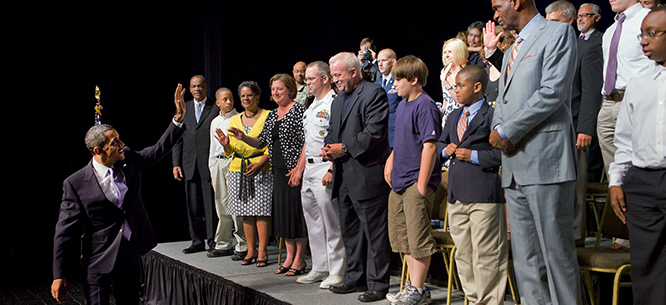


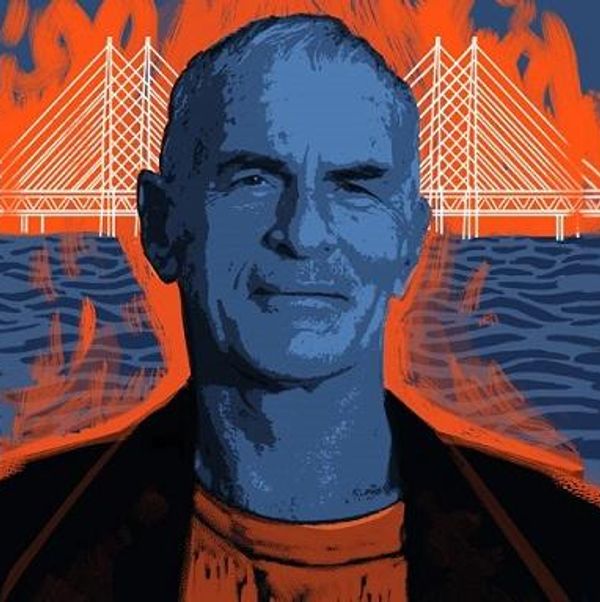
 NEW: Governor Ron DeSantis’ lawyers were forced by the court to define “woke.” The lead lawyer described it as “The belief there are systemic injustices in American society and the need to address them.”
NEW: Governor Ron DeSantis’ lawyers were forced by the court to define “woke.” The lead lawyer described it as “The belief there are systemic injustices in American society and the need to address them.”
